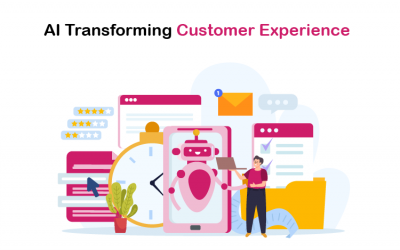How Employee Engagement Impacts Customer Experience

Providing a complete customer experience is a vital element for a company to generate better sales. You can enhance a customer’s experience through their interaction by increasing employee engagement and focusing more on how employee engagement impacts customer experience.
Employee engagement impacts the customer experience in significant ways. Employees are the backbone of your organization, playing a crucial role in keeping your company up and running. When employees are engaged, supported, and motivated, they contribute more to the business and exhibit higher levels of productivity. This translates into better customer service, as engaged employees are more likely to go the extra mile to meet customer needs and provide a positive experience.
By prioritizing employee engagement, you create a lively work environment that fosters growth for both your employees and your brand. When employees feel valued and supported, they are more committed to their roles, resulting in improved customer interactions. Engaged employees are more likely to genuinely connect with customers, understand their needs, and provide personalized solutions, ultimately enhancing the overall customer experience.
On the other hand, neglecting the needs of your employees can have long-term consequences and hinder your business’s growth. Customer satisfaction declines when there is a lack of dedicated and engaged staff, resulting in improper execution of company functions. Investing in employee engagement not only improves the working environment but also positively impacts customer loyalty and retention.
In conclusion, employee engagement impacts customer experience directly. Prioritizing and fostering a culture of employee engagement creates a positive ripple effect that improves customer interactions, builds loyalty, and ultimately increases revenue for your company. By understanding the intrinsic link between employee engagement and customer experience, businesses can pave the way for sustainable growth and success.
Employees are your biggest advocates.

Employees are your number one advocate, and they’re the fuel that keeps the machine running. When you try to work towards CX (customer experience), it’s essential to dive into the mindset and preferences of the demographic you’re targeting. Employee engagement impacts customer experience significantly, and it plays a crucial role in shaping how customers perceive your brand.
By prioritizing employee engagement, you create an environment where employees feel valued, supported, and motivated. Engaged employees are more likely to embody the values and mission of your brand, becoming enthusiastic campaigners for your company. They become instrumental in proving to your audience how supportive you are towards your employees, which, in turn, enhances the overall customer experience.
Genuinely engaged employees go above and beyond to deliver exceptional customer service. They understand the needs and preferences of your target demographic and can cater to them effectively. Their positive interactions and genuine care leave a lasting impression on customers, fostering loyalty and driving customer satisfaction.
Furthermore, engaged employees serve as powerful advocates for your brand. They authentically convey your commitment to employee well-being and demonstrate how your brand values translate into superior customer experiences. By investing in employee engagement, you create a virtuous cycle where satisfied employees deliver exceptional customer experiences, leading to increased customer loyalty and brand reputation.
Engaged Employees Offer High-Quality Service
As customers, you may have encountered a good customer service experience that made your process easier or simply made your day.
Maybe a customer service agent waived a service fee as a show of goodwill, or a front desk hotel clerk upgraded your room free of charge.
The consistent theme running through these examples is that employees were highly engaging.
Employees sometimes tend to intentionally go beyond the minimum of what is expected because passion underpins their work. An engaged worker is fully immersed not just for the paycheck but because there lies an intrinsic motivation to deliver excellence.
Develops brand affinity

Very often, customer service employees represent your brand. Through the actions of those service workers, customers form opinions and associations that directly summarize the entirety of your brand, irrespective of who’s working behind the scenes or the effort put into the products.
Employees facing clients should genuinely enjoy working for the brand, its products, and its mission. Consequently, clients will be experiencing more than your typical transaction. They will build relationships with a sales associate based on similar interests and passions.
Customers feel valued
There is nothing that makes a customer feel more important than someone attentive and attentive to their needs. Customers will feel heard and valued, especially when workers guide potential buyers and provide helpful advice.
In order to provide customers with the right level of satisfaction, employers must engage their employees.
Even a simple “thank you” from time to time can go a long way. A survey showed that 83% of people claimed verbal recognition was more fulfilling than rewards or gifts.
Bottom line
A happy and engaging employee not only impacts the customer but also works the other way around. After constantly succeeding at making the customer satisfied, morale will be boosted. Customers will be happy when your employees are encouraged to stay loyal to your brand. Since they also act as representatives, workers’ behavior will directly reflect the brand’s image. Customers must feel valued and associated with your brand to become loyal. We hope this article proved insightful to you.
Recent Posts
- How People Analytics Can Utilize Data to Drive Business Results
- The Role of AI in Enhancing Employee Feedback Systems
- How Purpose-Built AI Can Help You Build A Great Customer Experience
- Why is Customer Sentiment Analysis Crucial to Your Business?
- Customer Experience Statistics You Need To Know for 2025 | CX Statistics 2024



